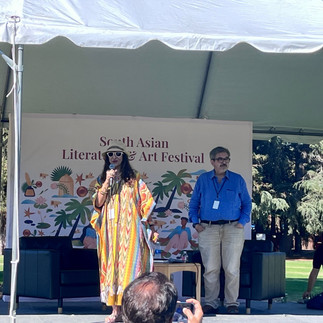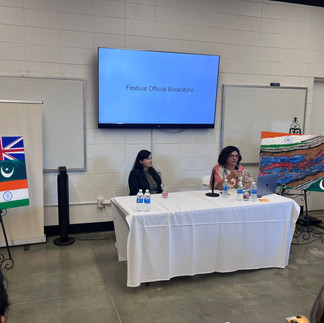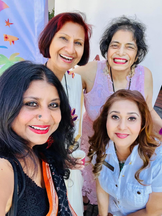SALA 2023: Remembering the Highlights
- Raji Writes

- May 28, 2024
- 8 min read
Updated: Jun 21, 2024
Yes, it has been several months since the South Asian Literature and Art Festival (SALA 2023) at Menlo College in Menlo Park, California. With SALA 2024 fast approaching. I thought it would be the perfect time to remember some of the wonderful 2023 sessions. After all, these festivals fill one’s heart and mind, and over the year, it is nice to remember and savor the elakkaya in the payasam, or the elaichi in the kheer, depending on your linguistic preference.

I offer you some memorable quotes from the featured authors and speakers (Shobhaa De, Konkona Sen Sharma, Abraham Verghese, Amitav Ghosh) as well as some photos and videos from the event. The keynotes were exceptional.
Amitav Ghosh
“Writing for the New Yorker will kill your voice.”
Thus spake Amitav Ghosh during his keynote session. A piece of his that was published in the esteemed east coast magazine had 43 readers, he shared in astonishment. Forty-three. Let that sink in.
In a discussion about his latest book, “Smoke and Ashes”, Amitav Ghosh spoke with Raghu Karnad on the final day of SALA 2023 in Menlo Park, California.

Ghosh’s Ibis Trilogy, Karnad said, was a supernova of insights from the 17th to the 21st century. He introduced the term narco-colonialism to the audience, explaining how poppy and its product opium were weapons for power and greed: poppy bonds with pain, but also with the human propensity for wealth. People have always used psycho-altering drugs, but ones you could pick up in fields.
Ghosh gave a captivating account of how he went from having no interest in China, to appreciating its influence in the world. Back in his family home in Calcutta after a visit to China, he was drinking tea, or in China, “cha.” In Bengali, sugar is “cheeni” and peanuts are “chinebadam.” All from China. He realized that objects are telling you a story that’s different from the history in your books.
In Smoke and Ashes, Ghosh writes about the "original drug dealers", the British government, which through the East India Company spread opium addiction in China and across the world. Interestingly, the opium trade was the origin of the immense wealth of many prominent American families, such as the Astors, the Coolidges.
Konkona Sen Sharma
“Shallow and lucrative field like advertising”
Konkona Sen Sharma brought her charm, talent and wit to the stage. She absolutely won my heart by quoting a line from Upamanyu Chatterjee's novel English, August while quipping that she got a degree in English so she could work in some shallow and lucrative field like advertising, adding hastily “That’s a line from English, August!” This is the line she referred to, spoken by newly-minted IAS Officer Agastya, aka August: “I should have been a photographer, or a maker of films, something like that, shallow, and urban.”
She regaled the audience with stories from when her mother played games with her as a child, to when she directed her in Rapist.
Shobhaa De
“You have to speak up, no matter what.”
Shobhaa De. Where do I begin? What an extraordinary, courageous, outspoken individual, not to mention absolutely gorgeous. On age, she said women are marginalized, "put to pasture" after child-bearing years. Age in many ways inhibits a woman from many things. Not Shobhaa. She turned 75 recently, and is youthful and energetic enough for another 75 years of enriching all our lives. Interlocuter Salil Tripathi aptly described her as insatiable. Tripathi credited her for giving him his first job as a journalist and allowing him to interview writer Salman Rushdie and painter MF Husain. The bond and affection between mentor and protégé was touching in its warmth.
Tripathi commented that at 75, even though De is glowing, India is going through a dark time. A person was lynched because meat in his refrigerator was suspected to be beef. At the time, De had tweeted, “I’ve just consumed beef, come and kill me.” She continued to the rapt audience, “I’m no Jhansi ki Rani, But you have to have principles. You have to speak up, no matter what.” She remarked, if everything is going to be “Bharatized”, that is another way of obliteration, adding, “If you don’t vote for change, you have only yourself to blame. You choose your leaders.”
Wise words indeed. India's electorate has always amazed me in its extraordinary commitment to democracy -- a shining example for those in the US, and really anywhere who speak or think the 8 worst words in a democracy: "I am going to sit this one out." No! Cast your vote. It is a privilege and a responsibility.
There was a beautiful discussion of language. Shobhaa called herself the “grandmother of Hinglish,” speaking of how her unique blend of Hindi and English became mainstream, appearing in Amul ads, even Times of India headlines. She referred to Rushdie’s acronym for the language of Mumbai, “Hug-me”: Hindi, Urdu, Gujarati, Marathi, English. She remarked eloquently, “Writing is so fluid, it has to change – like a river, it picks up words from the banks.” She gave the example of “badass”, which is very unique to contemporary English. There is no Indian language equivalent.
Recounting her achievements when she was younger, Tripathi pointed out that she was a champion athlete with Bombay records, having represented Maharashtra in hockey and basketball. Her early modeling days helped her understand the value of independence.
Kama Sutra a “conspiracy against the west!”
She wrote about female sexual pleasure 40 years ago. One of the professors called her Lady Kama Sutra, which led to a hilarious riff. The Kama Sutra, she exclaimed, is “such a conspiracy against the west! You can’t do these without breaking your neck.”
Speaking of her husband, Dilip De, she said she was born as a gypsy to very conservative parents who didn’t know what to make of her; her husband, however, understood. She has been married to him for 42 years, having turned down a Reuters fellowship from Stanford to remain in India and be with him. She recounted this story, and the decision to marry De in less than 48 hours of meeting him in response to a question from Tripathi on what intuition is. "It cannot be analyzed," she said.
Abraham Verghese.
“I was not homophobic, I was homo ignorant.”
“I learned more about manhood from them than I did from anywhere else. That’s what made me a writer,” Abraham Verghese said, speaking of his experiences with AIDS as a physician in rural Tennessee which led to his first book “My Own Country.” Instead of a predicted one case, he saw hundreds. Young people were leaving because they were gay. Verghese wrote a paper which was widely read. The language of science lacked the vocabulary to capture the grief of affected families and Verghese’s own heartache in the early days of the AIDS epidemic.
Verghese was in conversation with Ajit Singh, board chair of Art Forum SF which organizes the SALA festival, who spoke of the important role “Cutting for Stone” played in his life when his family was dislocated in India in 1985.
Some news to share: my review of The Covenant of Water published in India Currents received a 2023 California Journalism Award from the California Newspaper Publishers Association (CNPA)! You can see the review here with more illustrations from the book.
Poetry.
Ranjit Hoskote
“Look up upon translation as a bridge to another literary universe.”

After an engaging conversation with Monica Mody about contemporary poetry writing, Ranjit Hoskote, eloquent and gracious, said these words to a young poet who asked what advice he had: “Read as much as you can as, in many different languages.” As examples, he pointed to two translations of the Bhagavad Gita into English: one by Spanish translator Juan Mascaro and another by poet Mani Rao. Commenting on the challenges of caring for aging parents, he read an extraordinary poem from his collection Icelight, “Krishna’s End,” reflecting on mortality and the immortal.
Shikha Malaviya
“Anandibai, what should I write about today?”
Poet Shikha Malaviya would ask this question daily of her subject of her book, Anandibai Joshee, A Life in Poems, about India’s first female physician, and the first Indian woman to pursue an education in the United States. Malaviya read a few poems, from different times in Anandibai’s rich, eventful life, tragically cut short at just 22.
She spoke in a session moderated by Sandhya Gujjar, Triumph of a Woman, with Ava Homa, writer and activist from the Iranian side of Kurdistan, whose book Daughters of Smoke and Fire is a work of political fiction.
Partition Stories
“They say that land is mother and I felt my mother had aborted me.”
In moving accounts, several survivors or descendants of the Partition of India and Pakistan shared their families’ stories with Dr. Guneeta Singh Bhalla, the Founder and Executive Director of The 1947 Partition Archive, a public humanities organization, in a session moderated by Ritu Marwah. “Land is immobile”, some reflected, “even gold stays there. All you can take is your education.”
In the audience was Krishna ji, now 93, who was a 17-year-old college student in Lahore at the time of Partition, and shared some of her memories. The stories shared were emotional and stirring, and the session would have benefited from more structured time to allow survivors and family members to share their stories.
The Partition Archive has 11,000 stories to date, and captures the intergenerational trauma resulting from the violence and deep losses of that time.
Food and Drink.
“Tea is a sober sibling of wine,”
declared the founders of 4 purveyors of fine teas in the Chai GPT (Genuine Pure Tea) session. “Its taste depends on temperature, humidity, how it is plucked.” They presented tea as a non-alcoholic beverage. There were wonderful samples offered at the stalls outside.
“Technologically, we are very very far from AI being better without a human in the room.”
Said Nikhil Abraham, CloudChef CEO in a session on the intersection of art and AI. CloudChef enables consumers to eat from their favourite restaurants and chefs from across the world, locally, by codifying and perfectly replicating these dishes across the world in AI-powered cooking facilities. The premise of CloudChef is that with AI-powered distribution, recipes can be spread fast, saving years of time.Along with moderator Zehra Cataltepe, a computer engineer and a mom, from Turkey, and panelist Madhu Vudali, CEO of Faro, the group tackled questions such as “Does the fast forward by AI make us less of an artist?” and “Are we bypassing the opportunity to become better humans and better artists?”
Food for thought indeed.
Panel discussion with Kalpana Mohan and Shobha Tharoor Srinivasan
I was very pleased to moderate a session “First Country: Our Mothers and Fathers” with Bay Area authors Kalpana Mohan and Shobha Tharoor Srinivasan on their books honoring their father and mother respectively. You can read my review of Shobha's book here.

It was a pleasure to draw out various details about their books, both with South Indian protagonists, with origins in Palakkad in Kerala. Lily Tharoor is a member of the Kerala Nair community, and Daddykins was a member of the Tamil Brahmin community. (In their honor, I wore a Kerala kasavu sari, hand-embroidered by weavers in Palakkad.)
The session was packed, the authors were a pleasure to listen to, and the attentive audience had some great questions. Sandhya Gujjar, one of the volunteers at the event, had kind words to say about the session on a Substack post honoring her own mother.
A high-quality recording made by the SALA audio-visual team can be viewed at the ArtForumSF YouTube channel.
Here are photos from SALA 2023, of speakers and attendees.
It was a huge pleasure to speak with Shobhaa De at a pre-event gathering. We took a photo together to share with a mutual friend, the immensely talented and gracious chef Suvir Saran who now lives in Delhi. For her keynote session, Shobhaa wore a multicolored caftan, as vibrant as her personality, and as captivating as her smile.
In this collage:
Art Forum SF Executive Director Ambika Sahay kicking off the event,
Tom Kailath and Anuradha Luther Maitra--it is always a pleasure to see them at South Asian literary and cultural events, which they support not least with their presence, participation, time and energy,
with Shikha Malaviya,
Ranjit Hoskote, signing my copy of Icelight,
with my fabulous panelists, Shobha Tharoor Srinivasan and Kalpana Mohan,
with Sunita Sohrabji, Tanya Momi, and Barnali Ghosh,
with Sunaina, beloved daughter,
with Kiran Malhotra--ever the gracious and welcoming host/organizer. Her attire, jewelry and style are always simply fabulous.
I did not get photos this year with Ambika Sahay and Mayuranki Almaula, tireless organizers. At SALA 2024, for sure! It's coming up on September 28th and 29th, at Stanford University. so mark your calendars!

















































"I always enjoy your writing style. It’s easy to follow yet packed with valuable information."
Best Pet Food Supplier in Pakistan